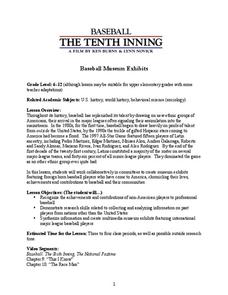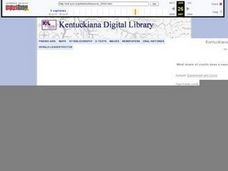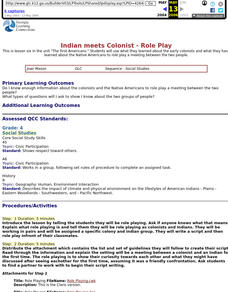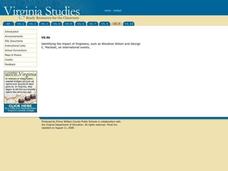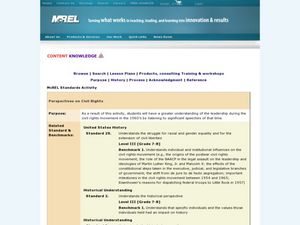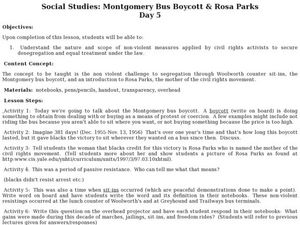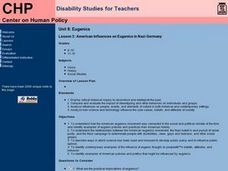Center for Civic Education
The Power of Nonviolence: Music Can Change the World
Here is a fantastic activity through which class members discover how music has the ability to influence others in a meaningful way. After reviewing selected pieces and modern-day protest songs, learners will research other songs that...
John F. Kennedy Presidential Library & Museum
Analyzing the Inaugural Address
Get high school historians to step outside their own shoes by responding to JFK's inaugural address from the perspective of a civil rights activist, a soviet diplomat, or a Cuban exile. After a class discussion about the address,...
PBS
President Theodore Roosevelt: Foreign Policy Statesman or Bully?
Can a negative perception of a president's foreign policy harm his or her historical legacy? A project that winds the clock back to the date of Theodore Roosevelt's death puts students at the editorial desk of a fictional newspaper....
Curated OER
Martin Luther King Jr. and Nonviolence
Using the book, Martin's Big Words, learners will discover the life of Dr. Martin Luther King Jr. Vocabulary is identified throughout the story by using several his famous protest speeches as examples. Class discussions on racism, during...
Curated OER
Revolution! Freedom for All?
Twelfth graders examine the causes of freedom by revolutionary patriots. In this Civics and Economics lesson, 12th graders analyze primary sources. Students work cooperatively to write a freedom declaration for their group.
PBS
Baseball: The Tenth Inning
The intent of this resource is to explore Latin American accomplishments in baseball, recognizing the changes in demographics of players over the last century. Social studies classes begin with a discussion and brainstorm surrounding...
Curated OER
Researching Equality and Justice
Choosing from a list, researchers investigate topics that range from the women in the American Civil Rights movement to the quest for equal rights in Iraq and Afghanistan. Although the plan is not detailed, a link to a PBS site that...
Curated OER
Federal Court Systems and Court Cases
Ninth graders investigate the basis for the Common Law Tradition. They examine the organization of the Federal Court System and students identify the various sources of the American Law.
Curated OER
Youth voters and election turnout
Students investigate why 18- to 24- year-olds have a low turnout at the polls. Students develop a plan to encourage young Americans to vote, or write a persuasive essay telling why they should vote.
Benjamin Franklin Tercentenary
Benjamin Franklin’s Community Contributions
Students research Benjamin Franklin's community contributions. In this social studies lesson plan, students create a collage showing things they can do to improve their communities.
Curated OER
Indian Meets Colonist - Role Play
Students role play as colonists and Indians. They are assigned a specific colony and Indian group, and write a script and then role play in front of their classmates.
Curated OER
The Unseen Army: Conscientious Objectors During World War II
Learners study World War II and why it was called "the Good War". In this World War II lesson learners identify the different kinds of conscientious objectors.
Curated OER
Government: The Mystery Epidemic
Students are able to identify some roles of government in dealing with the prevention and treatment of skin cancer. They are able to list two reasons why the occurrence of skin cancer in youths has increased.
Curated OER
The Right to Remain Resilient
Students examine the Civil Rights Movements in the U.S., both current and historic. In small groups students investigate a specific civil rights group, create an illustrated timeline, noting key events, people, and state and federal laws.
Curated OER
Taxation Without Representation
Eighth graders empathize with how colonists felt when they were taxed without representation. They use a metaphor of students and a school principal to describe the strained relationship that developed between the colonies and Britain.
Curated OER
The Importance of Plants to Native Cultures in the Past and Present
Eighth graders investigate the founding and history of Sluice Boxes State Park. They use both primary and secondary resources to collect data. The focus is upon the use of native plants to make medicines. They write reports about several...
Curated OER
Civil Rights
Students study the social and political events in Virginia linked to desegregation and massive resistance and their relationship to national history. They examine the "Jim Crow" laws and how they affected the lives of African Americans...
Curated OER
Perspectives on Civil Rights
Students examine speeches of the Civil Rights Era. In this American history lesson, students listen to speeches delivered by Martin Luther King, Jr. and John F. Kennedy. Students respond to guiding questions as they listen to the...
Curated OER
Role of Citizens in Montgomery Bus Boycott
Students consider the role of average Americans in the Montgomery Bus Boycott. In this Civil Rights instructional activity, students listen to a lecture that outlines the details of the boycott. Students conduct further research about...
Curated OER
Montgomery Bus Boycott & Rosa Parks Day 5
Learners study the Montgomery Bus Boycott. For this American Civil Rights lesson, students listen to a lecture about segregation, Rosa Parks, and the bus boycott. Learners discuss passive resistance and its effectiveness.
Center for Civic Education
Constitution Day: What Basic Ideas are in the Preamble to the Constitution?
Young scholars investigate the document of the Constitution as part of a national day of recognition. The lesson plan uses many different activities to dissect the national document to increase student awareness of how the Constitution...
Curated OER
The Gettysburg Address: An American Treasure
Learners apply information found in Lincoln's speeches, especially The Gettysburg Address, to create a persuasive speech on a current topic.
Curated OER
American Influences on Eugenics in Nazi Germany
High schoolers examine the Eugenics movement in America. They discover the Nazi's belief in racial purity and how it relates to Eugenics. They also analyze how science has been influential in creating public policy.
Curated OER
The Staffing Exercise: A Lesson Cluster for Civics
Students discuss gender bias and non-traditional career areas as they relate to governmental appointed positions. The participate in a simulation in which they apply for and decide who would get traditionally male positions in the Dept....
Other popular searches
- U.s. American Civics
- Us American Civics
- Chapter 1 American Civics
- Holt American Civics
- American Civics and Activism
- Chapter 2 American Civics
- Civics American Goverment





